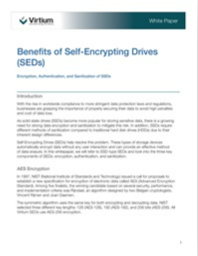Benefits of Self-Encrypting Drives (SEDs)
SSDs require different methods of sanitization compared to traditional hard disk drives (HDDs) due to their inherent design differences. Self-Encrypting Drives (SEDs) help resolve this problem. These types of storage devices automatically encrypt data without any user interaction and can provide an effective method of data erasure. In this whitepaper, we will refer to SSD-type SEDs and look into the three key components of SEDs: encryption, authentication, and sanitization.
Download this whitepaper to find out more.
Read More
By submitting this form you agree to Virtium LLC contacting you with marketing-related emails or by telephone. You may unsubscribe at any time. Virtium LLC web sites and communications are subject to their Privacy Notice.
By requesting this resource you agree to our terms of use. All data is protected by our Privacy Notice. If you have any further questions please email dataprotection@techpublishhub.com
Related Categories: Components, Embedded, Power, Processors


More resources from Virtium LLC

Virtium vtGuard: Mitigating the Threat of SSD Data Corruption from Unexpected Power Failures
This whitepaper presents the data corruption effect on an SSD when a system loses power during a write separation.
It will illustrate the adv...

Serialization and Traceability of Storage Products
Virtium's focus is to provide high- reliability storage products to OEMs making infrastructure and communications equipment for the Internet of Thi...

Virtium TuffDrive® PATA SSDs
Virtium TuffDrive Parallel ATA (PATA) solid state drives (SSDs) are direct replacements for legacy PATA hard disk drives (HDDs) found in industrial...
